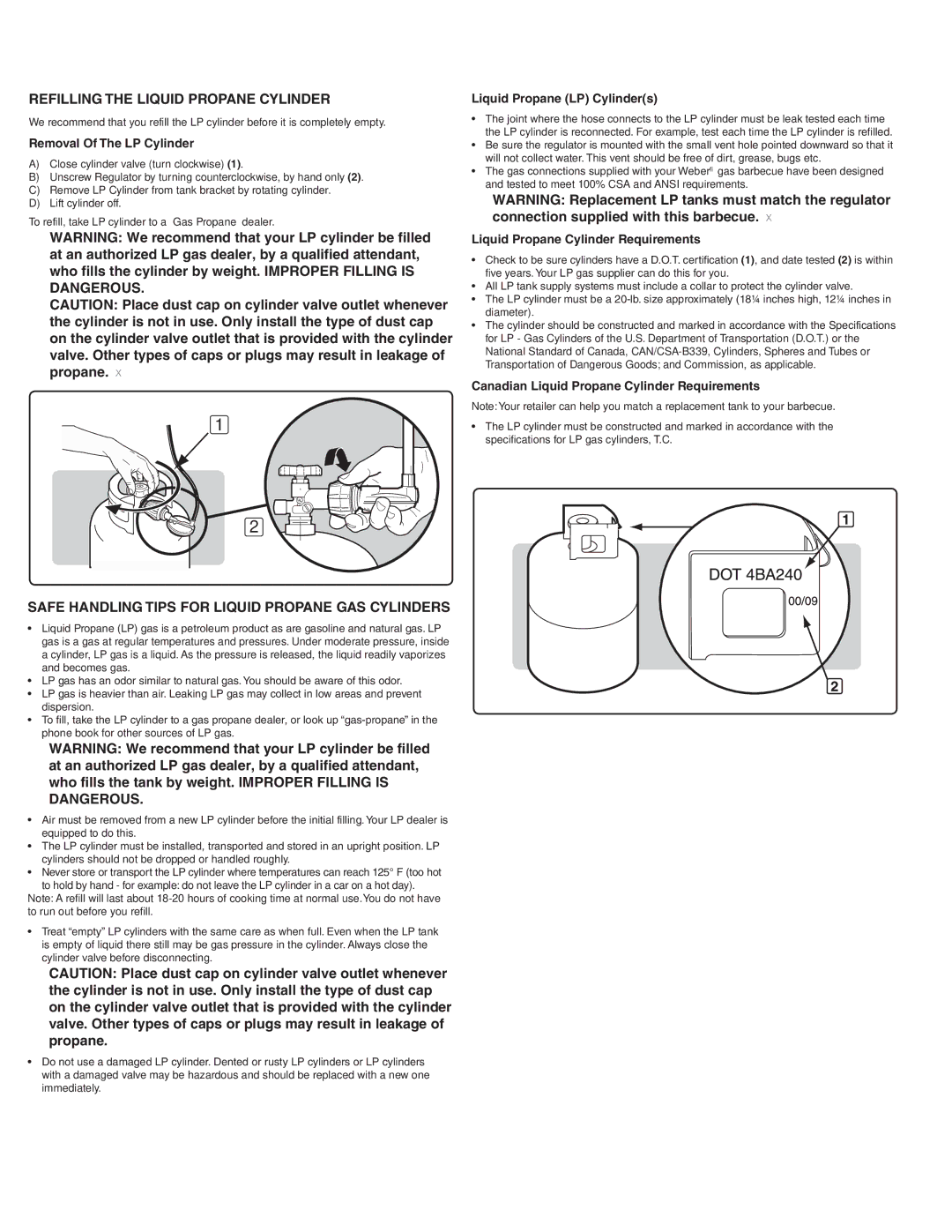
GAS INSTRUCTIONS
REFILLING THE LIQUID PROPANE CYLINDER
We recommend that you refill the LP cylinder before it is completely empty.
Removal Of The LP Cylinder
A)Close cylinder valve (turn clockwise) (1).
B)Unscrew Regulator by turning counterclockwise, by hand only (2).
C)Remove LP Cylinder from tank bracket by rotating cylinder.
D)Lift cylinder off.
To refill, take LP cylinder to a “Gas Propane” dealer.
mWARNING: We recommend that your LP cylinder be filled at an authorized LP gas dealer, by a qualified attendant, who fills the cylinder by weight. IMPROPER FILLING IS DANGEROUS.
mCAUTION: Place dust cap on cylinder valve outlet whenever the cylinder is not in use. Only install the type of dust cap on the cylinder valve outlet that is provided with the cylinder valve. Other types of caps or plugs may result in leakage of propane. ◆
1
2
SAFE HANDLING TIPS FOR LIQUID PROPANE GAS CYLINDERS
•Liquid Propane (LP) gas is a petroleum product as are gasoline and natural gas. LP gas is a gas at regular temperatures and pressures. Under moderate pressure, inside a cylinder, LP gas is a liquid. As the pressure is released, the liquid readily vaporizes and becomes gas.
• LP gas has an odor similar to natural gas. You should be aware of this odor.
•LP gas is heavier than air. Leaking LP gas may collect in low areas and prevent dispersion.
•To fill, take the LP cylinder to a gas propane dealer, or look up
mWARNING: We recommend that your LP cylinder be filled at an authorized LP gas dealer, by a qualified attendant, who fills the tank by weight. IMPROPER FILLING IS DANGEROUS.
•Air must be removed from a new LP cylinder before the initial filling. Your LP dealer is equipped to do this.
•The LP cylinder must be installed, transported and stored in an upright position. LP cylinders should not be dropped or handled roughly.
•Never store or transport the LP cylinder where temperatures can reach 125° F (too hot to hold by hand - for example: do not leave the LP cylinder in a car on a hot day).
Note: A refill will last about
•Treat “empty” LP cylinders with the same care as when full. Even when the LP tank is empty of liquid there still may be gas pressure in the cylinder. Always close the cylinder valve before disconnecting.
mCAUTION: Place dust cap on cylinder valve outlet whenever the cylinder is not in use. Only install the type of dust cap on the cylinder valve outlet that is provided with the cylinder valve. Other types of caps or plugs may result in leakage of propane.
•Do not use a damaged LP cylinder. Dented or rusty LP cylinders or LP cylinders with a damaged valve may be hazardous and should be replaced with a new one immediately.
Liquid Propane (LP) Cylinder(s)
•The joint where the hose connects to the LP cylinder must be leak tested each time the LP cylinder is reconnected. For example, test each time the LP cylinder is refilled.
•Be sure the regulator is mounted with the small vent hole pointed downward so that it will not collect water. This vent should be free of dirt, grease, bugs etc.
•The gas connections supplied with your Weber® gas barbecue have been designed and tested to meet 100% CSA and ANSI requirements.
mWARNING: Replacement LP tanks must match the regulator connection supplied with this barbecue. ◆
Liquid Propane Cylinder Requirements
•Check to be sure cylinders have a D.O.T. certification (1), and date tested (2) is within five years. Your LP gas supplier can do this for you.
•All LP tank supply systems must include a collar to protect the cylinder valve.
•The LP cylinder must be a
•The cylinder should be constructed and marked in accordance with the Specifications for LP - Gas Cylinders of the U.S. Department of Transportation (D.O.T.) or the National Standard of Canada,
Canadian Liquid Propane Cylinder Requirements
Note: Your retailer can help you match a replacement tank to your barbecue.
•The LP cylinder must be constructed and marked in accordance with the specifications for LP gas cylinders, T.C.
26
